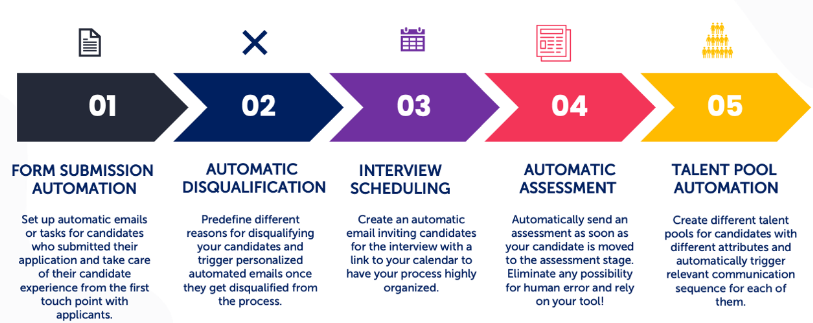Recruitment Automation
What is Recruitment Automation?
Definition:
Recruitment automation refers to the use of technology, artificial intelligence (AI), and machine learning (ML) to automate and improve various stages of the recruitment process. It encompasses a range of activities, from resume parsing and candidate sourcing to interview scheduling and onboarding.
Analogy:
Consider recruitment automation as a high-tech recruitment assistant. Similar to how a capable assistant would handle repetitive tasks, manage schedules, and provide valuable insights, recruitment automation tools take on routine recruitment activities, allowing human resources professionals to focus on strategic decision-making and building meaningful connections with candidates.
Further Description:
Recruitment automation involves the integration of technology into different aspects of the hiring process, including:
Resume Parsing and Screening: Automated systems analyze resumes, extracting relevant information and matching candidates with job requirements, thereby speeding up the initial screening process.
Candidate Sourcing: Automation tools can search through various online platforms to identify potential candidates, expanding the talent pool and ensuring a diverse range of applicants.
Interview Scheduling: Streamlining the interview scheduling process by automating the coordination of interview dates and times, reducing manual effort and minimizing scheduling conflicts.
Communication and Engagement: Automated communication tools keep candidates informed about their application status, provide updates, and facilitate a seamless and transparent communication process.
Onboarding: Automation extends to the onboarding process, ensuring a smooth transition for new hires by automating paperwork, training schedules, and orientation materials.
Why is Recruitment Automation Important?
Efficiency and Time Savings: Automation accelerates the recruitment process, reducing the time spent on administrative tasks and allowing recruiters to focus on strategic and relationship-building aspects of their role.
Improved Candidate Experience: Automation ensures timely and personalized communication with candidates, enhancing their overall experience and positively impacting the employer brand.
Data-Driven Decision Making: Recruitment automation generates valuable data and analytics, enabling HR professionals to make informed decisions, identify trends, and continuously improve recruitment strategies.
Cost Savings: By automating repetitive tasks, companies can reduce operational costs associated with manual processes and allocate resources more effectively.
Examples and Usage:
Applicant Tracking Systems (ATS): These systems automate the entire recruitment process, from receiving applications to managing candidate data and communication.
Chatbots and Virtual Assistants: Automated chatbots engage with candidates, answer queries, and provide information about job openings, significantly enhancing the candidate experience.
Video Interviewing Platforms: Automated video interview platforms facilitate remote interviewing, allowing recruiters to assess candidates efficiently and at scale.
Key Takeaways:
- Recruitment automation utilizes technology to streamline and enhance various aspects of the hiring process.
- It includes resume parsing, candidate sourcing, interview scheduling, communication, and onboarding.
- Benefits include increased efficiency, improved candidate experience, data-driven decision-making, and cost savings.
- Examples of recruitment automation tools include Applicant Tracking Systems (ATS), chatbots, and video interviewing platforms.





